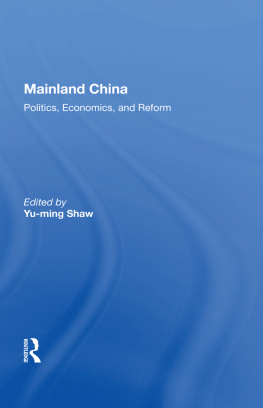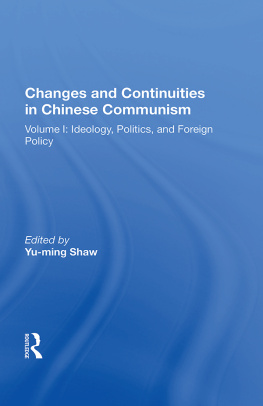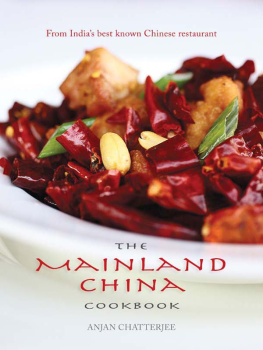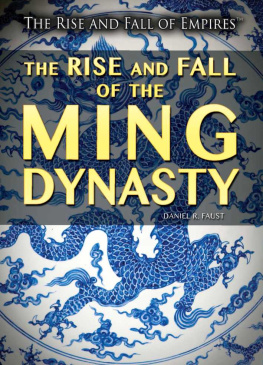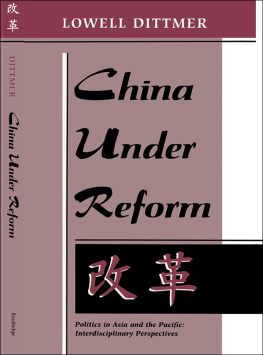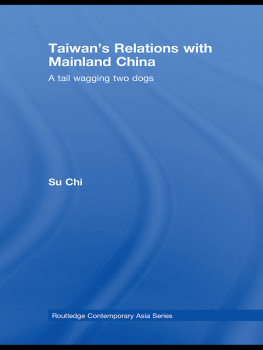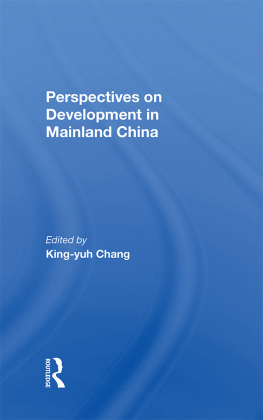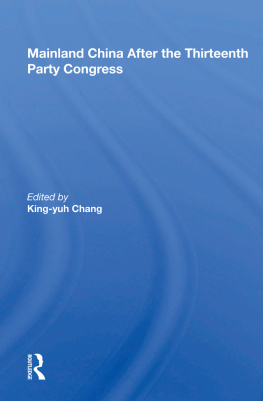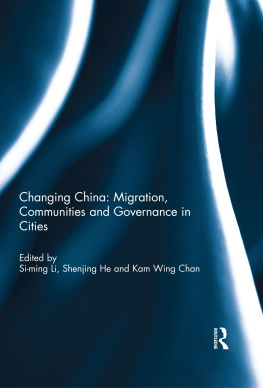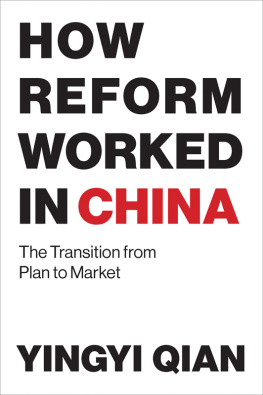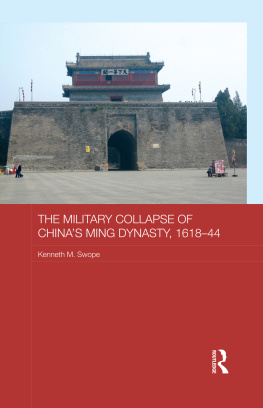Mainland China
Westview Special Studies
The concept of Westview Special Studies is a response to the continuing crisis in academic and informational publishing. Library budgets are being diverted from the purchase of books and used for data banks, computers, micromedia, and other methods of information retrieval. Interlibrary loan structures further reduce the edition sizes required to satisfy the needs of the scholarly community. Economic pressures on university presses and the few private scholarly publishing companies have greatly limited the capacity of the industry to properly serve the academic and research communities. As a result, many manuscripts dealing with important subjects, often representing the highest level of scholarship, are no longer economically viable publishing projectsor, if accepted for publication, are typically subject to lead times ranging from one to three years.
Westview Special Studies are our practical solution to the problem. As always, the selection criteria include the importance of the subject, the works contribution to scholarship, and its insight, originality of thought, and excellence of exposition. We accept manuscripts in camera-ready form, typed, set, or word processed according to specifications laid out in our comprehensive manual, which contains straightforward instructions and sample pages. The responsibility for editing and proofreading lies with the author or sponsoring institution, but our editorial staff is always available to answer questions and provide guidance.
The result is a book printed on acid-free paper and bound in sturdy library-quality soft covers. We manufacture these books ourselves using equipment that does not require a lengthy make-ready process and that allows us to publish first editions of 300 to 1000 copies and to reprint even smaller quantities as needed. Thus, we can produce Special Studies quickly and can keep even very specialized books in print as long as there is a demand for them.
About the Book and Editor
Over the past several years, Mainland China has undertaken reforms in various domestic areas, including culture and society, education, the economy, and the Communist Party. In addition, since September 1982 Peking has begun to pursue an independent course in foreign relations. In this volume, based on the Thirteenth Sino-American Conference in Taipei, contributors provide a penetrating analysis of the problems Peking faces in trying to implement reforms and of possible future developments in its domestic and foreign policies. In Part 1 they examine ideological theory and practice, party reform, the Hong Kong question, political corruption, population controls, and cultural and educational problems. Part 2 includes discussion of the Mainland Chinese economic system as a whole, the issue of special economic zones, and agricultural reforms. The final part focuses on Chinas foreign policy, looking specifically at Pekings relations with India and Western Europe and at the Washington-Peking-Moscow triangle.
Dr. Yu-ming Shaw is the director of the Institute of International Relations, Taipei, and professor in the Graduate School of International Law and Diplomacy at National Chengchi University. He is the editor of Power and Policy in the PRC (Westview, 1985).
Published in cooperation with the Institute of International Relations, Taipei, Taiwan
First published 1986 by Westview Press
Published 2018 by Routledge
52 Vanderbilt Avenue, New York, NY 10017
2 Park Square, Milton Park, Abingdon, Oxon OX14 4RN
Routledge is an imprint of the Taylor & Francis Group, an informa business
Copyright 1986 by Taylor & Francis
All rights reserved. No part of this book may be reprinted or reproduced or utilised in any form or by any electronic, mechanical, or other means, now known or hereafter invented, including photocopying and recording, or in any information storage or retrieval system, without permission in writing from the publishers.
Notice:
Product or corporate names may be trademarks or registered trademarks, and are used only for identification and explanation without intent to infringe.
Library of Congress Catalog Card Number: 8551582
ISBN: 0-8133-0267-6
ISBN 13: 978-0-367-00624-2 (hbk)
Contents
PART ONE
POLITICS IN THE PRC
, Hsien-yun Chao
, Cal Clark
, Tai-chun Kuo
, Lowell Dittmer
, Chalmers Johnson
, Alan P.L. Lui
, C. Montgomery Broaded
, Lynn T. White III
, Wen Lang Li
, James T. Myers
PART TWO
ECONOMICS IN THE PRC
Robert F. Dernberger
, Jan S. Prybyla
, K. C. Yeh
Ramon H. Myers
, Feng-hwa Mah
, Ting-chung Chen
PART THREE
FOREIGN POLICY OF THE PRC
, Ching-yao Yin
, Richard J. Kozicki
, Douglas T. Stuart
, William E. Griffith
Peter Van Ness
, Bih-jaw Lin
, Harold C. Hinton
Over the past several years the Peoples Republic of China (PRC) has undertaken reforms in various domestic areas, including those of party, culture, society, education, and the economy. Also, since September 1982, the PRC has spoken of pursuing an independent course in foreign relations. These reforms and changes offer a challenging subject for examination. A group of well-known scholars from the United States and the Republic of China (ROC) addressed this topic in Taipei, Taiwan, in June 1984 at the Thirteenth Sino-American Conference. Sponsored by the Institute of International Relations, the conference that generated this book provided valuable insights into and analysis of the problems the PRC faces in implementing current reforms. Possible future developments in its domestic and foreign policies were also considered.
I thank the cosponsors of the conference for their support and Westview Press for publishing these papers. I am indebted to many friends and colleagues at the Institute of International Relations for their assistance in the organization of the conference and the publication of the proceedings. My predecessor, Dr. King-yuh Chang, planned and ran the conference from beginning to end; we all owe him our gratitude.
Yu-ming Shaw
Part 1
Politics in the PRC
1
The Chinese-type Socialist Road: Theory and Practice
Hsien-yun Chao
A New Slogan in Substitution for the Four Modernizations
The term Chinese-type socialist road, or socialism with Chinese characteristics, made its first formal appearance in Teng Hsiao-pings opening address to the Twelfth Chinese Communist Party (CCP) National Congress on September 1, 1982. In the period between the Third Plenary Session of the Eleventh CCP Central Committee in December 1978 and this congress, the same concept was generally referred to as Chinese-type modernization. By substituting Chinese-type socialist road, Teng seems to have attached more importance to the political significance of the Four Modernizations.
In a communiqu issued on December 22, 1978, the Third Plenary Session of the Eleventh CCP Central Committee stated that in the early years after the founding of Communist China, especially after the socialist transformation had been basically completed, Mao Tse-tung had instructed the whole Party to shift the focus of its work to the economy and the technical revolution. The communiqu also announced that the Party would shift the focus of work to socialist modernization in the following year. At that time, Teng had already gained the upper hand over Hua Kuo-feng in the struggle for the leadership.

